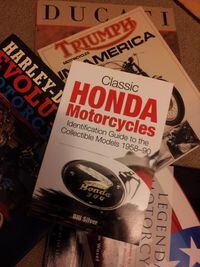You might be surprised to learn—especially if you notice the stream of readers' corrections that appear almost monthly in "MC Mail"—that we actually do a lot of research in the process of writing articles around here. Especially lately, as we prepared so much historical content for our yearlong MC100 retrospective, we spent countless hours studying bikes, events and personalities often from decades before we were even born.
Of course, the Google search box at the top of our Web browser got plenty of exercise. While nothing compares to the immense amount of information Google delivers in mere milliseconds, online research demands a caveat emptor approach. Consider the following result reached after Googling "John Britten, V1100" (29,800 results, 0.29 seconds), while fact-checking Alan Cathcart's article that appeared in our October 2012 issue.
"Jason Britten was a custom bike builder who died in the early nineties. He was trying to get his brand of motorcycles started, but died suddenly from a brain aneurism."
Besides confusing visionary motorcycle designer John Britten with professional stuntrider Jason Britton—and greatly exaggerating the latter's death!—this entry dismisses Britten's stunning V1100 as a mere "custom bike," and also confuses the New Zealander's death from skin cancer with a brain aneurism.
As I'm so often forced to do in this situation, I shut my laptop and rolled my desk chair over to the bookshelf to select a REAL BOOK, containing ACTUAL KNOWLEDGE, to fact-check the story. Unlike a blog post, a book is not a casual production. In most cases it’s the result of years of research by a properly trained, professional journalist, which is then vetted and painstakingly edited by a reputable publisher. As a result, a book is (usually) reliable and credible in a way that few Web sites will ever be.
My moto-book library is surprisingly large and stunningly diverse. It's also disturbingly dated. Ten years ago I would add to my collection one or two great new motorcycle books every month. Now I'm surprised to find one or two useful titles each year. I'm thinking about this now because I just received one such book: "Classic Honda Motorcycles: Identification Guide to the Collectible Models 1958-90," written by Bill Silver and published by Octane Press.
There's nothing sexy about Silver's 220-page paperback, with its two-color cover and illustrations consisting exclusively of black-and-white studio press shots. At the same time, it is almost priceless to anyone seeking factual information on every noteworthy Honda motorcycle made during that 32-year period. Exhaustively researched and remarkably complete, informed by original production materials, period journalism, riding impressions and more, Silver gives a thorough picture of each model complete with specs, production details, trim variations from year-to-year, and other useful information.
Every time I receive a book like "Classic Honda Motorcycles," I wonder if it will be the last. Given the state of modern publishing, there's simply little motivation—financial or otherwise—to produce motorcycle books. This I know this first-hand. I once wrote a book titled "Honda Motorcycles," which was published by Motorbooks International and is now out of print. My book was considerably sexier than Silver's, a 192-page coffee-table tome lushly illustrated in full color, and written in an editorial style that should have theoretically appealed to a wider range of readers. Still, it barely sold its initial production run, and I never made a penny off the project. Now, more than 12 years later, the book still hasn't earned back its advance.
My book project was ultimately a labor of love, and I have a hunch that Silver's was the same. I just hope that there are enough Bill Silvers out there to continue producing resources like this—and fewer writers like me, because I doubt I'll ever undertake another book-length endeavor again. The book writing process is necessary to contain and communicate the immense amount of motorcycle knowledge that has been gathered over the last hundred-odd years. As wonderful as the Interwebs might be, we still can't rely on it exclusively as a source for rock-solid research. Now, I'm off to Amazon to see about adding a copy of Tim Hanna's book "John Britten" to my own personal library. And I'll hope that someone eventually writes a book about our friend Jason Britton, the still-very-alive American stunter. It's clear we can't trust his memory to Google results.











/cloudfront-us-east-1.images.arcpublishing.com/octane/VZZXJQ6U3FESFPZCBVXKFSUG4A.jpg)
/cloudfront-us-east-1.images.arcpublishing.com/octane/QCZEPHQAMRHZPLHTDJBIJVWL3M.jpg)
/cloudfront-us-east-1.images.arcpublishing.com/octane/HXOUJXQWA5HBHGRO3EMJIGFMVI.jpg)

/cloudfront-us-east-1.images.arcpublishing.com/octane/3TIWWRV4JBBOLDVGRYECVVTA7Y.jpg)
/cloudfront-us-east-1.images.arcpublishing.com/octane/KIX5O23D5NAIBGFXBN3327DKZU.jpg)
/cloudfront-us-east-1.images.arcpublishing.com/octane/7GJYDUIPXRGMTMQKN6ONYOLBOU.jpg)
/cloudfront-us-east-1.images.arcpublishing.com/octane/MUQLOVLL2ZDGFH25ILABNBXKTI.jpg)
/cloudfront-us-east-1.images.arcpublishing.com/octane/TNOU5DNE2BC57MFPMGN2EIDXAM.jpg)
/cloudfront-us-east-1.images.arcpublishing.com/octane/GTCXACQGJ5HAPDTGWUQKDEH44E.jpg)
/cloudfront-us-east-1.images.arcpublishing.com/octane/S35YGSEMEZB4BLTDJTSZPF4GLA.jpg)
/cloudfront-us-east-1.images.arcpublishing.com/octane/5UOT6HPX2JFMRJAX6EH45AR4MQ.jpg)
/cloudfront-us-east-1.images.arcpublishing.com/octane/OKWOJWAKP5EP3OACCRRWPCIX2Q.jpg)
/cloudfront-us-east-1.images.arcpublishing.com/octane/2WF3SCE3NFBQXLDNJM7KMXA45E.jpg)
/cloudfront-us-east-1.images.arcpublishing.com/octane/G4MG6OUCJNBSHIS2MVVOTPX65E.jpg)
/cloudfront-us-east-1.images.arcpublishing.com/octane/IIGGWFOTOJGB7DB6DGBXCCMTDY.jpg)
/cloudfront-us-east-1.images.arcpublishing.com/octane/QSTCM6AVEZA5JJBUXNIQ3DSOF4.jpg)
/cloudfront-us-east-1.images.arcpublishing.com/octane/U4I7G625B5DMLF2DVIJDFZVV6M.jpg)
/cloudfront-us-east-1.images.arcpublishing.com/octane/B6XD6LS6IVCQPIU6HXDJSM3FHY.jpg)
/cloudfront-us-east-1.images.arcpublishing.com/octane/ICL63FEDDRDTTMINYICCEYGMDA.jpg)
/cloudfront-us-east-1.images.arcpublishing.com/octane/FCGZHQXRBZFLBAPC5SDIQLVF4I.jpg)
/cloudfront-us-east-1.images.arcpublishing.com/octane/WNOB6LDOIFFHJKPSVIWDYUGOPM.jpg)

/cloudfront-us-east-1.images.arcpublishing.com/octane/X33NU3E525ECRHXLNUJN2FTRKI.jpg)